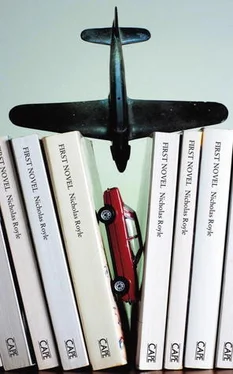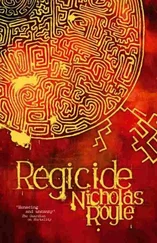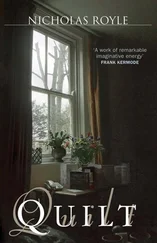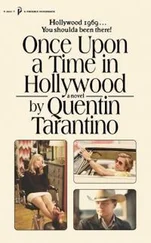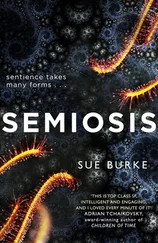He’d been due to come to see me earlier today, however, about the First Novels unit that I run alongside the workshop for the MA as well as the BA. While waiting for him, I had moved my chair away from the desk until it was facing one of the room-dividers. I was sitting forward in the chair, having lowered it slightly, until my spine was curved over and my elbows were resting on my knees. I pictured myself as a graphic on a piece of laminated card stored in a seat pocket. I placed my hands over my head, one on top of the other, unclasped. I felt the rough fabric of the room-divider where it grazed the front of my head. On a plane, that would be the back of the seat in front.
It was at this point that there was a knock on the door. I waited for a moment or two then pushed back the chair and crossed the room. I opened the door to allow Lawrence Duncan — or Duncan Lawrence — to enter.
‘Hey,’ he said.
‘Hi,’ I said, as I led him across the room to my corner.
‘Why,’ he asked, after a minute or two of small talk, ‘has Philip Pullman’s first novel never been reissued? I mean, he’s mega. A reprint of The Haunted Storm would clean up, wouldn’t it?’
‘Of course it would. That’s one of the things we’ll discuss in the group,’ I said, fiddling with the lever on my chair to raise it to the correct height. ‘Why do some writers go to such lengths to keep their first novels out of the hands of readers? In Pullman’s case, he refuses even to talk about it. If you manage to get hold of a copy and you ask him to sign it at a reading, he refuses. So I’m told. I haven’t tried. But copies of the first edition go for a grand. With his signature even more.’
‘Cool. That explains why I’ve not been able to get hold of a copy.’
‘The paperback is a little easier to find, but only a little. You can pay a hundred quid for a copy on eBay.’
‘Dude, you can, perhaps. I can’t,’ he said with a laugh.
The nerves Lawrence Duncan — or Duncan Lawrence — had shown in my first encounter with him had not reappeared since then. They had been interview nerves. Nothing more. Once on the course, he was as relaxed and informal as students tend to be these days.
‘I have an idea to get around this problem,’ I said.
‘What? The photocopier?’
‘That would be against copyright law.’
He shrugged and raised his hands palms upward as if to say, ‘What copyright law?’
‘I have two copies,’ I said. ‘It’s a small group.’
‘You loan it out.’
‘Exactly.’
‘And we take great care of it.’
‘Precisely.’
‘Coolio,’ he said, then: ‘Dude, I’d like to read your novel but I can’t find a copy anywhere. How about you do the library thing with that?’
My thoughts about the tutorial with Lawrence Duncan — or Duncan Lawrence — are interrupted by the sound of some-one calling from out of the darkness on the other side of the street.
‘Paul,’ the voice says again as its owner crosses the road. ‘I thought it was you. Ksssh-huh-huh .’
He stands in front of me, as if barring the way, smiling.
‘Yes,’ I say.
‘Come and have a drink.’ He indicates the pub on the corner.
I glance at a figure who walks past us. Untidy shock of white hair, green anorak unzipped, suit trousers at half mast — Polling Station Man. On polling days he sits behind a desk in the local primary school and crosses voters’ names off his list. At other times he is seen walking with long strides and carrying a single white plastic carrier bag. I remember standing in the polling booth not knowing where to place my cross, unable to choose. Either this one or that one.
‘I’ve got to get back,’ I say to Lewis, showing him the milk I’ve bought.
‘Come on. All the lads are there. AJ’s not there, but Jon and Chris and Gary. Kelvin—’
‘Kelvin?’
‘Yeah, you know, the pilot. Wasn’t my idea, but still. Ksssh-huh-huh .’
I look at the shopping bag in my hand.
‘I don’t know,’ I say. ‘Maybe a quick one.’
‘ Ksssh-huh-huh .’
The pub is noisy and smells of damp bar towels. I accept a drink from Lewis and sit down in the only free seat next to a man I don’t know who is telling a story about a football match.
‘… and this guy’s constantly shouting out that he’s a cunt.’
‘The linesman?’ says Gary, whom I have met before, somewhere.
‘Yeah, this guy behind me is shouting out in a really miserable voice that the linesman’s a cunt, like, every time he misses an offside. “You’re a cunt, liner. You’re a cunt, liner.” On and on and on. And then the linesman does raise his flag. He does give an offside, and an ironic cheer goes up from the crowd and a round of applause. And this guy, he times it perfectly. He waits a moment, until the noise has died down, and then in this, like, moment of quiet you hear his voice, really kind of morose but still timed to perfection, aware of the effect he was about to create: “You’re still a cunt, liner.”’
The story prompts laughter in the group. I raise my glass to my lips. The lads say hello to me and we exchange small talk. As soon as there is an opportunity I move around and take a seat next to Kelvin. I remind him where we’ve met and he says he remembers.
‘You’re obviously not flying tomorrow,’ I say to him, looking at his pint.
‘They’re very careful,’ he says. ‘Random testing. It’s not worth it.’
We sip our drinks as another story is begun in which I have no interest.
I turn to Kelvin.
‘Is it true,’ I ask him, ‘what they say about brace? About the brace position?’
‘What?’
‘I heard that the brace position doesn’t save lives. Isn’t intended to save lives. It’s designed to ensure that you die instantly by snapping your neck. Because it’s cheaper for the airlines to pay out for wrongful death than lifelong disablement. So if the plane’s going down, they’d rather you die than survive with terrible injuries. Also, it handily keeps all the body parts together in one place.’
‘Where did you hear that?’ he asks.
‘Two guys on a train,’ I say. ‘So, it’s true, then? I mean, I can see it would make the job of cleaning up considerably easier. From the point of view of identification and so on.’
Kelvin looks up from his pint. ‘Conspiracy theory,’ he says. ‘The brace position does save lives in the event of a crash. Kegworth proved that. Remember Kegworth?’
I remember Kegworth.
‘All right,’ I say. ‘Last question. Is it true that the engines on an airliner are designed to fall off if something goes badly wrong?’
Kelvin places his pint on the table. ‘The engines on a Boeing 747 were designed to break away in the event of catastrophic failure, but it didn’t work out the way they planned. In one or two cases, the engine that broke free, instead of dropping safely to the ground, smashed into the other engine on the same wing. You can imagine the consequences. Amsterdam, for example. You remember Amsterdam?’
I remember Amsterdam.
I go to the bar to buy a round and when I rejoin the group, I find myself sitting next to Lewis. He looks at me and grins as I pass him a pint of bitter.
‘All right?’ he asks.
I nod.
‘ Ksssh-huh-huh .’
I look away. We sit in silence for a few moments. I put my hand in my pocket and take it out again.
‘What’s that?’ he asks, looking at my hand.
I see that I’m holding one of the pieces of red plastic, the one into which my thumb slots neatly, and I’m caressing it with my fingers.
‘It’s from my back garden. I’ve dug a whole load of it up. I don’t know what it is or where it’s come from.’
Читать дальше
